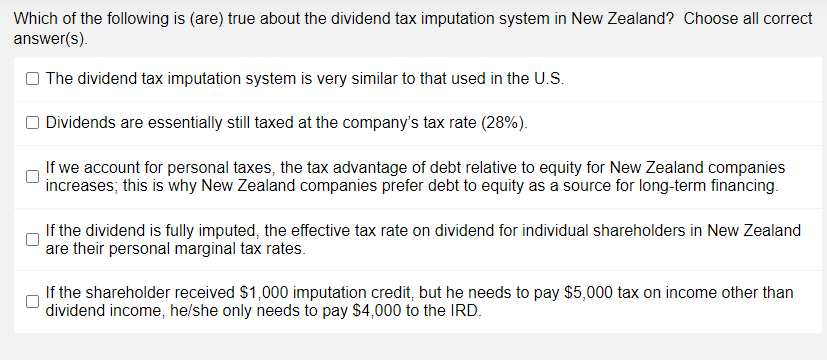Which of the following is (are) true about the dividend tax imputation system in New Zealand? Choose all correct answer(s). O The dividend tax imputation system is very similar to that used in the U.S. O Dividends are essentially still taxed at the company's tax rate (28%). If we account for personal taxes, the tax advantage of debt relative to equity for New Zealand companies increases; this is why New Zealand companies prefer debt to equity as a source for long-term financing. If the dividend is fully imputed, the effective tax rate on dividend for individual shareholders in New Zealand are their personal marginal tax rates. If the shareholder received $1,000 imputation credit, but he needs to pay $5,000 tax on income other than dividend income, he/she only needs to pay $4,000 to the IRD.
Which of the following is (are) true about the dividend tax imputation system in New Zealand? Choose all correct answer(s). O The dividend tax imputation system is very similar to that used in the U.S. O Dividends are essentially still taxed at the company's tax rate (28%). If we account for personal taxes, the tax advantage of debt relative to equity for New Zealand companies increases; this is why New Zealand companies prefer debt to equity as a source for long-term financing. If the dividend is fully imputed, the effective tax rate on dividend for individual shareholders in New Zealand are their personal marginal tax rates. If the shareholder received $1,000 imputation credit, but he needs to pay $5,000 tax on income other than dividend income, he/she only needs to pay $4,000 to the IRD.
Intermediate Financial Management (MindTap Course List)
13th Edition
ISBN:9781337395083
Author:Eugene F. Brigham, Phillip R. Daves
Publisher:Eugene F. Brigham, Phillip R. Daves
Chapter15: Distributions To Shareholders: Dividends And Repurchases
Section: Chapter Questions
Problem 2Q: How would each of the following changes tend to affect aggregate payout ratios (that is, the average...
Related questions
Question

Transcribed Image Text:Which of the following is (are) true about the dividend tax imputation system in New Zealand? Choose all correct
answer(s).
The dividend tax imputation system is very similar to that used in the U.Ss.
O Dividends are essentially still taxed at the company's tax rate (28%).
If we account for personal taxes, the tax advantage of debt relative to equity for New Zealand companies
increases; this is why New Zealand companies prefer debt to equity as a source for long-term financing.
If the dividend is fully imputed, the effective tax rate on dividend for individual shareholders in New Zealand
are their personal marginal tax rates.
If the shareholder received $1,000 imputation credit, but he needs to pay $5,000 tax on income other than
dividend income, he/she only needs to pay $4,000 to the IRD.
Expert Solution
This question has been solved!
Explore an expertly crafted, step-by-step solution for a thorough understanding of key concepts.
Step by step
Solved in 2 steps

Knowledge Booster
Learn more about
Need a deep-dive on the concept behind this application? Look no further. Learn more about this topic, finance and related others by exploring similar questions and additional content below.Recommended textbooks for you

Intermediate Financial Management (MindTap Course…
Finance
ISBN:
9781337395083
Author:
Eugene F. Brigham, Phillip R. Daves
Publisher:
Cengage Learning



Intermediate Financial Management (MindTap Course…
Finance
ISBN:
9781337395083
Author:
Eugene F. Brigham, Phillip R. Daves
Publisher:
Cengage Learning




